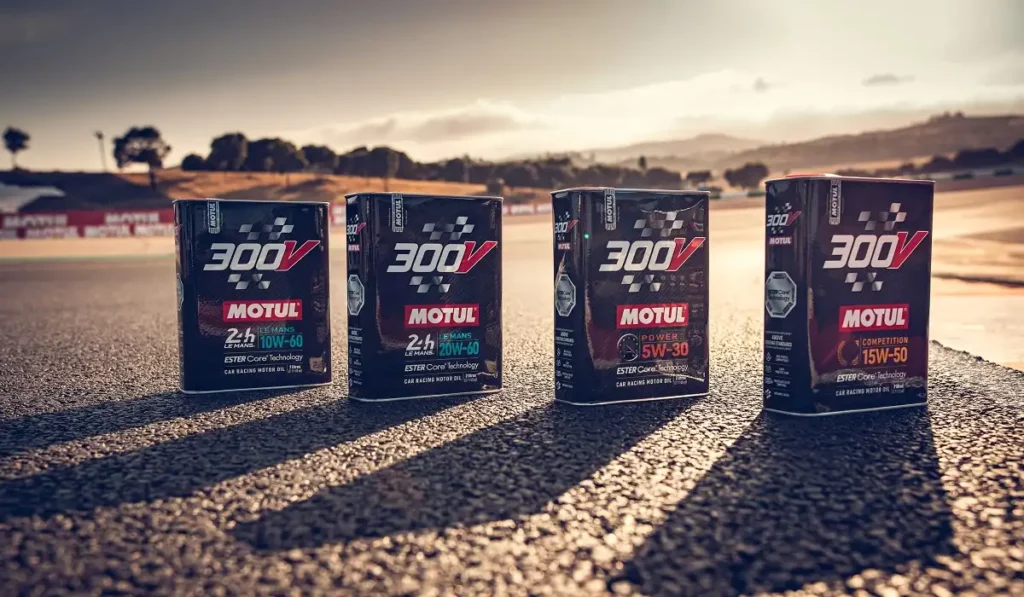The automotive industry has undergone a remarkable evolution in recent decades, driven by technological advancements that have revolutionized various aspects of vehicle design and performance. Among the critical areas of innovation is the development of automotive lubricants, which play a crucial role in ensuring optimal engine function and longevity. Over time, lubricant technology has witnessed significant progress, with the emergence of synthetic oils standing out as a game-changer.
Join us on this enlightening journey through the evolution of automotive lubricants, where we will uncover the remarkable impact of synthetic oils and how Motul has been at the forefront of innovation. Discover how these advancements have elevated engine efficiency, extended engine life, and paved the way for a greener and more sustainable automotive future.

Conventional Lubricants: An Overview
Conventional lubricants have been the go-to choice for the automotive industry for many decades. These lubricants, typically derived from mineral oil bases, have played a vital role in reducing friction and protecting engine components from wear and tear. However, as automotive technology advanced and engines became more demanding, the limitations of conventional lubricants became increasingly apparent.
Conventional lubricants have certain inherent drawbacks. They tend to break down at high temperatures, resulting in viscosity loss and reduced lubricating efficiency. Additionally, their molecular structure is less uniform, leading to inconsistent performance across different temperature ranges. This limitation becomes particularly critical in extreme climates or during intense operating conditions.
Moreover, conventional lubricants require more frequent oil changes due to their limited resistance to oxidation and contamination. This not only increases maintenance costs but also raises concerns about environmental sustainability due to the higher volume of used oil generated.
Needless to say, it wasn’t long before the automotive industry reached a level where a new type of lubricant was necessary.
The Emergence of Synthetic Oils
In response to the limitations of conventional lubricants, the automotive industry witnessed a groundbreaking development with the emergence of synthetic oils. Synthetic oils represent a significant leap forward in lubricant technology, offering a host of advantages over their conventional counterparts.
Unlike conventional lubricants that are derived from crude oil, synthetic oils are artificially engineered through a complex process of chemical synthesis. This process allows for precise control over the molecular structure and composition of the lubricant, resulting in a more uniform and tailored product.
One of the primary advantages of synthetic oils is their improved viscosity index and stability across a wide range of temperatures. Unlike conventional lubricants that tend to thin out at high temperatures and thicken in colder conditions, synthetic oils maintain their optimal viscosity, ensuring consistent lubrication and reduced friction throughout varying operating conditions.
Additionally, synthetic oils offer enhanced wear protection and reduced friction compared to conventional options. Their unique chemical composition allows for better lubrication and reduced metal-to-metal contact, resulting in reduced engine wear, improved efficiency, and extended engine life.
Our Motul 8100 series of oils are a great example of this. These are formulated to form a durable protective film over all internal components of the engine. This film remains on all internal components even when the engine is off for prolonged periods of time. Next time you start the engine, there’s already enough lubrication on key internal components to protect them from excessive cold start wear.
Another notable benefit of synthetic oils is their extended oil change intervals. Due to their superior resistance to oxidation and degradation, synthetic oils can endure longer periods without significant loss of performance, reducing the frequency of oil changes and associated maintenance costs. Moreover, this increased durability translates into reduced environmental impact, as fewer oil changes result in less used oil disposal.
It is within this context of advancement that Motul, a leading lubricant manufacturer, made its mark. Motul was at the forefront of the synthetic oil revolution, being the first to introduce semi-synthetic and full synthetic engine oils that pushed the boundaries of lubricant performance.
Motul: Pioneering Semi-Synthetic and Full Synthetic Oils

A renowned name in the lubricant industry, Motul has played a pioneering role in the development of synthetic oils. The company’s commitment to innovation and pushing the boundaries of lubricant technology led to the invention of both semi-synthetic and full synthetic engine oils, revolutionizing the automotive industry.
This journey began in 1966 when the company introduced the world’s first semi-synthetic engine oil, known as Motul Century 2100. This groundbreaking formulation blended synthetic components with mineral oil bases, offering a remarkable improvement in engine performance and protection. The introduction of semi-synthetic oils marked a significant turning point in the lubricant industry, bridging the gap between conventional and fully synthetic lubricants.
Motul’s semi-synthetic oils offered several advantages over traditional mineral oil-based lubricants. They exhibited enhanced high-temperature resistance, ensuring consistent lubrication and reduced viscosity breakdown even under demanding operating conditions. The improved stability of semi-synthetic oils led to reduced engine wear, increased fuel efficiency, and extended oil change intervals, providing both drivers and automotive manufacturers with tangible benefits.
Our dedication to innovation did not stop with semi-synthetic oils. Building on this success, the company went on to develop and introduce full synthetic engine oils, raising the performance bar even further. Full synthetic oils, such as the renowned Motul 300V, are meticulously engineered using advanced synthetic base stocks and tailor-made additive packages.
Full synthetic oils offered unparalleled lubrication properties, surpassing those of both conventional and semi-synthetic oils. Their uniform molecular structure and precise formulation allowed for exceptional temperature stability, excellent shear resistance, and optimal lubricating film thickness across all operating conditions. These qualities translated into reduced friction, minimized engine wear, improved power output, and enhanced fuel economy.
Motul’s dedication to research and development, coupled with their innovative spirit, led to a line of synthetic oils that set new benchmarks in engine protection and performance. The company’s continuous pursuit of excellence has made Motul a trusted partner for automotive enthusiasts, professional racing teams, and manufacturers worldwide.
The Impact of Synthetic Oils on the Automotive Industry
The introduction of synthetic oils has had a profound impact on the automotive industry, revolutionizing engine performance, longevity, and environmental sustainability. The numerous advantages offered by synthetic oils have made them the lubricant of choice for a wide range of automotive applications.
One of the key benefits of synthetic oils is their ability to enhance engine efficiency and power output. The superior lubrication properties of synthetic oils reduce friction between moving engine parts, allowing the engine to operate with less resistance. This results in improved power delivery, better acceleration, and overall enhanced performance, particularly in high-performance and sports cars.
Synthetic oils also contribute to the extended life of automotive engines. Their exceptional resistance to thermal breakdown and oxidation ensures that the lubricating film remains intact even under extreme temperature conditions. This minimizes engine wear, reduces the risk of component failure, and extends the overall lifespan of the engine.
In addition to performance benefits, synthetic oils offer improved fuel economy. Their lower viscosity and superior lubrication properties reduce internal engine friction, allowing for smoother operation and better energy efficiency. This translates into reduced fuel consumption, contributing to both cost savings for vehicle owners and reduced carbon emissions.
Furthermore, synthetic oils promote environmental sustainability. Their extended oil change intervals mean fewer oil changes and less used oil disposal, resulting in reduced environmental impact.
Motul, with its pioneering role in synthetic oil development, has played a significant part in driving these positive changes in the automotive industry. Their innovative formulations have set the standard for excellence and inspired other lubricant manufacturers to follow suit, leading to a broader adoption of synthetic oils across the automotive sector.
From high-performance sports cars to advanced hybrid vehicles, the impact of synthetic oils is felt in various automotive applications. Synthetic oils have become an integral part of modern vehicle technology.
The Continuing Evolution of Synthetic Oils

The evolution of synthetic oils continues to unfold as researchers and lubricant manufacturers strive for even greater advancements in performance and sustainability. Motul, known for its innovative approach, remains at the forefront of this evolution, constantly pushing the boundaries of synthetic oil technology. Here are some notable trends and developments shaping the future of synthetic oils in the automotive industry:
- Low-Viscosity Formulations — As automotive engines become more efficient and fuel economy standards become increasingly stringent, there is a growing emphasis on developing low-viscosity synthetic oils. These oils reduce internal friction and improve fuel efficiency, contributing to reduced emissions and lower operating costs for vehicle owners.
- Advanced Additive Technologies — Lubricant manufacturers, including Motul, are incorporating advanced additive technologies into their synthetic oil formulations. These additives enhance the oil’s performance in areas such as wear protection, detergency, and oxidation resistance. The result is improved engine cleanliness, reduced sludge formation, and enhanced overall engine protection.
- Customized Formulations for Specific Applications — Automotive technology continues to diversify, with the rise of electric vehicles, hybrid powertrains, and advanced turbocharged engines. Synthetic oil formulations are being tailored to meet the specific requirements of these different applications. Customized formulations ensure optimal lubrication and protection for the unique demands of each engine type, enhancing performance and efficiency.
- Sustainable and Eco-Friendly Solutions — In line with the global shift towards sustainability, lubricant manufacturers are focusing on developing synthetic oils with reduced environmental impact. This includes using base stocks derived from renewable sources, exploring biodegradable additives, and implementing eco-friendly manufacturing processes. The aim is to minimize the carbon footprint associated with lubricant production and usage.
Motul, renowned for its commitment to innovation, is actively involved in these ongoing developments. The company’s research and development efforts continue to yield groundbreaking lubricant solutions that meet the evolving needs of the automotive industry. Motul’s dedication to staying at the forefront of synthetic oil technology ensures that vehicle owners and enthusiasts can expect cutting-edge lubrication solutions for optimal engine performance and longevity.
Protect Your Engine with Motul
Synthetic oils have transformed the automotive industry by offering superior performance, extended engine life, and enhanced environmental sustainability. Motul’s pioneering role in inventing semi-synthetic and full synthetic engine oils has been instrumental in driving these advancements. As the industry continues to evolve, synthetic oils will remain a crucial component in achieving optimal engine performance, reducing emissions, and meeting the challenges of emerging automotive technologies.
Stay informed about the latest developments in synthetic oil technology, and consider Motul as a trusted partner in providing the lubrication solutions your vehicle deserves.




